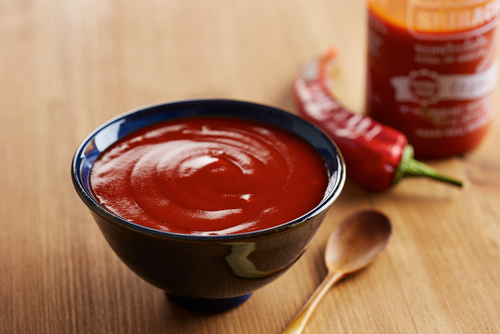Short answer
Sriracha sauce is not harmful when consumed occasionally. Be mindful to not use more than the (one teaspoon) serving size in order to prevent the overconsumption of sodium.
Recommended Alternative
Long answer
Sriracha has made a rapid rise to popularity among foodies and others for its ability to add a certain zest to foods. It is commonly found on the rack of condiments in cafes, delis, pizza parlors, and even fine restaurants. This popular condiment was created in California, in the 1980s, by David Tran from Vietnam. The ingredients in Sriracha, as listed on the label, include chili, sugar, garlic, distilled vinegar, potassium sorbate, sodium bisulfite, and xanthan gum. It has been altered from its original recipe to also contain fresh red jalapeno chili peppers and contains no artificial colors. Although it was originally created as a dipping sauce, it is now a common ingredient in the preparation of many foods, in addition to being added as a condiment to prepared foods once served.
Although it is only half as spicy as a jalapeno pepper, the capsaicin from chili peppers has long been known to boost metabolism and potentially increase weight loss. Capsaicin is a compound naturally found in chili peppers. Though there are some positive qualities from the natural compound, is a potent irritant to tissues in and outside of the body. Generally, the irritant is temporary, except in a large concentration. Ironically this temporary sensory irritant is why many people enjoy the spicy effect of Capsaicin. The temporary effect is also thought to be responsible for causing the release of endorphins and promoting serotonin uptake in the brain. Both endorphins and serotonin can lead to improved memory and a happier emotional state. Though there are some positive attributes to spicy foods, in general, it causes difficulty in the digestive system and can have a lasting damage in products that are excessively spicy. The amount present in Sriracha is unlikely to give damaging effects, though there may be some short-term discomfort while digesting the product.
Garlic is a very controversial food. Many researchers boast of its benefits, such as protecting the body against or preventing, cancers, heart disease, and infections. For centuries, people around the world have used it as a natural treatment for countless ailments, such as colds, stomach discomfort/illness, fever, stress, yeast infection, fatigue and others. Many other researchers stand on a soap box against garlic, boasting that it is responsible for causing many of the ailments and disease listed and more, claiming it is toxic in the body. However, even the anti-garlic activist agree that it is safe when not eaten in a raw form. We support the pro-garlic researchers, as garlic has been used for healing and prevention since its discovery, approximately 5,000 years ago. There is more evidence pointing towards garlic as a healthy food, than the claims of garlic as a toxin. As with many foods, however, there are occasional complaints of side effects affecting certain populations. Typical short-term side effects of garlic include gastrointestinal discomfort, heartburn, and acid reflux. Regardless of its health benefits or side effects, it is wise not to overconsume garlic during your lunch break, as it can create unpleasant breath that your coworkers may not appreciate.
Xanthan gum is an additive used to thicken products. Though harmless to many, it is derived from sources that many people are allergic to, such as corn, soy, dairy or wheat. Those who are affected by these allergens should inquire about the source that the Xanthan gum comes from in products they consume.
There is 100mg of sodium in the suggestive serving size of one teaspoon. Most people use multiple servings of the sauce, causing a high level of sodium intake, especially for a condiment. High sodium can cause side effects, such as dehydration, kidney damage, kidney stones, high risk for heart disease, edema (swelling of extremities), affect cognitive function, and numerous other conditions.
Health-conscious advocates of the “rooster sauce” also claim it has the ability to dissolve blood clots and improve circulation. Some say it helps reduce inflammation. In addition, it acts as an expectorant and helps fight colds. It increases sweat production further helping to flush out toxins, and can improve breathing by opening up the nasal cavities.
Possible short-term side effects
- skin irritation upon contact
- digestive discomfort
- edema
- impaired cognitive function
- unpleasant breath
- acid reflux/ heart burn
Possible long-term side effects
- with overconsumption:
- kidney disease
- hypertension
- heart disease
- digestive damage
- kidney stones
Ingredients to be aware of

Benefits
- weight loss
- better mood
- improved memory
- lower cholesterol
- lowed blood pressure
- combat colds
- healing properties (garlic)
Our Wellness Pick (what is this?)
Sky Valley Sriracha Sauce
- Made with red jalapeños
- Gluten-free recipe
- Vegan-friendly
- Low sugar content
- Only 5 calories/serving
 Approved by
Approved by 















